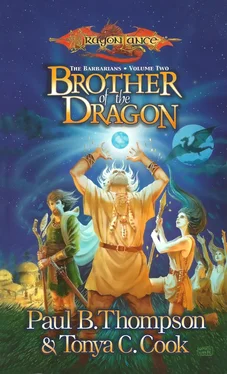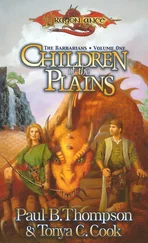Paul Cook - Brother of the Dragon
Здесь есть возможность читать онлайн «Paul Cook - Brother of the Dragon» весь текст электронной книги совершенно бесплатно (целиком полную версию без сокращений). В некоторых случаях можно слушать аудио, скачать через торрент в формате fb2 и присутствует краткое содержание. Жанр: Фэнтези, на английском языке. Описание произведения, (предисловие) а так же отзывы посетителей доступны на портале библиотеки ЛибКат.
- Название:Brother of the Dragon
- Автор:
- Жанр:
- Год:неизвестен
- ISBN:нет данных
- Рейтинг книги:3 / 5. Голосов: 1
-
Избранное:Добавить в избранное
- Отзывы:
-
Ваша оценка:
- 60
- 1
- 2
- 3
- 4
- 5
Brother of the Dragon: краткое содержание, описание и аннотация
Предлагаем к чтению аннотацию, описание, краткое содержание или предисловие (зависит от того, что написал сам автор книги «Brother of the Dragon»). Если вы не нашли необходимую информацию о книге — напишите в комментариях, мы постараемся отыскать её.
Brother of the Dragon — читать онлайн бесплатно полную книгу (весь текст) целиком
Ниже представлен текст книги, разбитый по страницам. Система сохранения места последней прочитанной страницы, позволяет с удобством читать онлайн бесплатно книгу «Brother of the Dragon», без необходимости каждый раз заново искать на чём Вы остановились. Поставьте закладку, и сможете в любой момент перейти на страницу, на которой закончили чтение.
Интервал:
Закладка:
Swallowing hard, Beramun took the woman’s hand. She was very strong, and effortlessly hauled the girl onto the horse behind her.
“Their camp is a half day’s journey from here. Have you ridden before?”
“A little.” She put her arms around the nomad woman’s waist. “My name’s Beramun. What shall I call you?”
The woman pulled her horse’s head around and thumped its ribs with her heels. “Call me Nianki,” she said.
The camp was a collection of tents and sod huts, cunningly hidden. Various traps and obstacles Beramun reckoned were meant to fend off attacks by the Silvanesti guarded the perimeter. There were pits covered with twigs and grass (for trapping enemies on horseback), dense hedges of thorn-bush and holly, fences of sharpened stakes arranged with the points raking outward, ditches full of water, and deadfall traps loaded with boulders and masses of earth. Nianki rode in carefully, avoiding each trap. The path was so intricate Beramun knew she could never have gotten in without a guide.
The camp proper was hidden behind a pair of hills, invisible to a casual observer. One moment Beramun and Nianki were riding along a narrow path between the hills, and in the blink of an eye, ten score dwellings appeared, arranged in three concentric circles around a central fire-pit. It was a busy scene, with half-naked children dashing about, dogs barking, artisans making baskets, blankets, and the little spears for Nianki’s throwing stick (“arrows,” she called them). Deeper in the camp were horse pens crowded with fine-looking animals. Beramun estimated there were five or six hundred people living here.
Few were as fair-haired as Nianki. Most had brown or black hair, like Beramun’s. There were also quite a few black men and women from across the northern sea, like Huru and Paharo back in Yala-tene. She wondered if any of these nomads came from her homeland on the southern plain.
People waved to Nianki as she cantered past, but no one displayed much curiosity about Beramun.
Nianki rode up to a large tent near the main firepit. Throwing a leg over her horse’s neck, she dropped to the ground. Beramun, less practiced, managed a barely controlled fall.
“Stay by me,” Nianki said tersely. Beramun followed like her shadow.
The tent was all one spacious room, with a high, pointed roof supported by a tripod of lashed poles. A simple stone hearth filled the center of the room, and the rest of the tent was dotted with baskets and pottery jugs, grass mats and fur blankets. When Nianki entered, someone at the back of the tent stood. Beramun’s eyes adjusted to the dimness, and she saw a girl about her own age — Nianki’s daughter, perhaps.
“Welcome home,” said the girl. She hurried over, bearing a tall, painted pot and cup. She poured pale yellow liquid into the cup and offered it respectfully to Nianki. From where she stood, Beramun smelled wine, though she’d never seen any that wasn’t red.
“Mara, this is Beramun. Make her comfortable until I return.” Nianki drained the cup and tossed it back to the girl. To Beramun, she said, “Wait here until I come back for you. If I find you outside, I’ll take you for a spy and deal with you accordingly.” She left.
Taking the initiative, Beramun introduced herself.
“I’m Mara,” the girl replied. She had curly red hair and a round, freckled face. “Would you like some nectar?”
“Water would be better.”
Mara scurried away to fetch it. Returning with a cup of water, she held it out to Beramun, eyes downcast. Her deference made Beramun uncomfortable.
Mara asked, “Have you known her long?”
“Nianki? We just met today.” She described her encounter with the centaurs.
“Ponaz dead? There’ll be rejoicing in camp when that news spreads!”
Beramun sat on a pile of furs. There was something about Mara, her manner or way of speaking, that seemed odd and out of place here. Nervous and thin, she resembled Nianki not at all. If not a daughter, was she a captive? Her bearing was unhappily similar to the raiders’ slaves.
“Are you a prisoner?” Beramun said abruptly.
Mara looked startled. “No! I’m very happy to be under my lady’s protection.”
My lady? Beramun had never heard such a term before. “Where are you from? You’re not one of these nomads.”
Mara edged away. “I am one now.”
“Have you been with them long? I need to know what kind of people these are. I’m on a mission, you see, from Yala-tene — ”
Mara’s green eyes widened. She dropped the water urn. The thick clay broke, spilling water on the grass floor mats. “Yala-tene!”
“You know it?”
“I was born there!”
Though hesitant at first, Mara told her story at Beramun’s urging.
Her father was an ox herder in Yala-tene, and she’d been an acolyte of the Sensarku. She’d gone on a journey over the mountains with another acolyte, a centaur, and the Sensarku leader, Tiphan, Konza’s son.
“Tiphan?” Beramun said. “I met him.”
“The wretch!” Mara’s unassuming manner vanished as anger brought a flush to her pale cheeks. “The cowardly dog! He abandoned Elu and me to the Silvanesti!”
“Don’t worry. He didn’t prosper after he left you.” Beramun told her of Tiphan’s death and the fate of rest of the Sensarku. If she thought the news would comfort Mara, she was wrong.
Mara wept. She poured out her grief to Beramun — grief for her friends and fellow acolytes slain, and despite herself, sorrow for Tiphan, too. Though arrogant and selfish, he had been her leader for many years and losing him was losing a large part of her past.
Beramun patted her back consolingly. “Whatever else he may have done, he died bravely, trying to destroy the green dragon,” she said.
Mara lifted her tear-streaked face. “Green dragon?”
Now it was Beramun’s turn to talk. She spared Mara nothing, beginning with the night she’d been captured by the raiders, through her escape from Almurk, to her final mission to find help for Amero’s people.
“If only these nomads would ride to the valley and settle Zannian for good!”
Mara brushed her tears away and composed herself. “They will go,” she said. “She is his sister, after all.”
“What? Who’s sister?”
“The Arkuden’s. Karada, born Nianki, daughter of Oto and Kinar, is the Arkuden’s sister.”
Beramun jumped to her feet. Nianki was Karada? She dashed to the tent flap and threw it open. There was Nianki — Karada — sitting on a stone, just outside.
Karada looked at her. “Where are you going?”
“To find you!” Beramun replied.
“Didn’t I tell you not to leave the tent?”
“Yes, but I didn’t know you were Karada.”
The famed nomad warrior stood and ducked under the flap. Beramun backed inside, more intimidated than ever.
“She’s telling the truth, isn’t she?” Karada said.
“I believe her,” Mara replied, and bent to pick up the pieces of the broken water jug.
“So do I.” Karada crossed the tent to the hearth.
Unable to bear the suspense, Beramun demanded, “Well? Are you going to help us? Will you ride to Yala-tene?”
Karada gazed at the smoldering embers in the firepit. “No,” she said.
Beramun was stunned. “How can you say that? Amero is your brother!”
Like a viper striking, Karada turned and thrust a finger into Beramun’s face. “I know who he is,” she said coldly. “His troubles are his own, just as mine are my own. I never asked Amero for help against the Silvanesti. Why should he want me to save him from this Zannian?”
Beramun stood her ground, though she was shaking inside. “Because everything he’s ever done will be lost if Zannian wins — the village, the valley, all the people of Yala-tene. How can you let that happen?”
Читать дальшеИнтервал:
Закладка:
Похожие книги на «Brother of the Dragon»
Представляем Вашему вниманию похожие книги на «Brother of the Dragon» списком для выбора. Мы отобрали схожую по названию и смыслу литературу в надежде предоставить читателям больше вариантов отыскать новые, интересные, ещё непрочитанные произведения.
Обсуждение, отзывы о книге «Brother of the Dragon» и просто собственные мнения читателей. Оставьте ваши комментарии, напишите, что Вы думаете о произведении, его смысле или главных героях. Укажите что конкретно понравилось, а что нет, и почему Вы так считаете.












